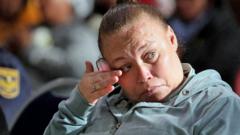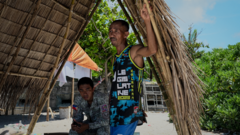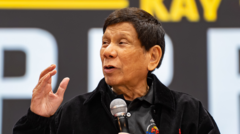After nearly facing execution, Veloso's story sheds light on human trafficking and the plight of overseas workers.
Filipina Mary Jane Veloso Returns Home After 15 Years on Death Row

Filipina Mary Jane Veloso Returns Home After 15 Years on Death Row
Mary Jane Veloso, a Filipina who spent 15 years imprisoned in Indonesia, has been granted reprieve and is returning to her home country.
Mary Jane Veloso, a 39-year-old mother of two, has finally returned to the Philippines after spending nearly 15 years on death row in Indonesia. Veloso was sentenced to death in 2010 after being found in possession of 2.6 kilograms of heroin at Yogyakarta Airport. Throughout her ordeal, she maintained her innocence, claiming that she was deceived into carrying the drugs by the daughter of one of her godparents, who had promised her a job as a maid.
On Tuesday night, Philippine authorities facilitated her transfer back home after an agreement was reached between the governments of Indonesia and the Philippines. At a news conference following her release, Veloso expressed gratitude and hope for a fresh start, stating, “This is a new life for me and I will have a new beginning in the Philippines.” She emphasized her desire to reunite with her children, remarking, “I have to go home because I have a family there.”
Although she will return as a prisoner, there remains the possibility that Philippine President Ferdinand Marcos may intervene on her behalf. Veloso's initial execution date was set for 2015; however, a last-minute reprieve was secured after authorities arrested a woman implicated in recruiting Veloso for human trafficking. This late intervention allowed her to become a prosecution witness in the case.
The significant public support Veloso received in the Philippines reflects a broader societal issue. Many Filipinos, particularly women, seek employment abroad due to economic challenges at home, often exposing themselves to exploitation. Her case resonated deeply, spurring widespread calls for human rights protections for migrant workers.
As Veloso left prison, she expressed her longing for the comforts of home, carrying personal belongings like a guitar and books, and wearing items gifted by friends. Her return comes shortly after the release of five members of the "Bali Nine," a group similarly entangled in drug trafficking cases. Veloso’s journey underscores the complexities of international drug laws, human trafficking, and the vulnerabilities of migrant workers in a globalized world.
On Tuesday night, Philippine authorities facilitated her transfer back home after an agreement was reached between the governments of Indonesia and the Philippines. At a news conference following her release, Veloso expressed gratitude and hope for a fresh start, stating, “This is a new life for me and I will have a new beginning in the Philippines.” She emphasized her desire to reunite with her children, remarking, “I have to go home because I have a family there.”
Although she will return as a prisoner, there remains the possibility that Philippine President Ferdinand Marcos may intervene on her behalf. Veloso's initial execution date was set for 2015; however, a last-minute reprieve was secured after authorities arrested a woman implicated in recruiting Veloso for human trafficking. This late intervention allowed her to become a prosecution witness in the case.
The significant public support Veloso received in the Philippines reflects a broader societal issue. Many Filipinos, particularly women, seek employment abroad due to economic challenges at home, often exposing themselves to exploitation. Her case resonated deeply, spurring widespread calls for human rights protections for migrant workers.
As Veloso left prison, she expressed her longing for the comforts of home, carrying personal belongings like a guitar and books, and wearing items gifted by friends. Her return comes shortly after the release of five members of the "Bali Nine," a group similarly entangled in drug trafficking cases. Veloso’s journey underscores the complexities of international drug laws, human trafficking, and the vulnerabilities of migrant workers in a globalized world.


















